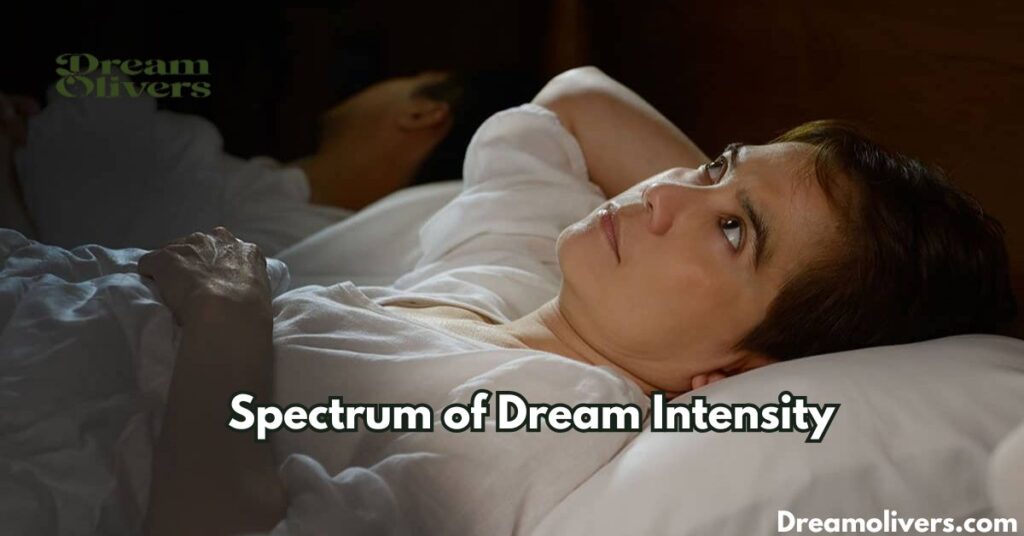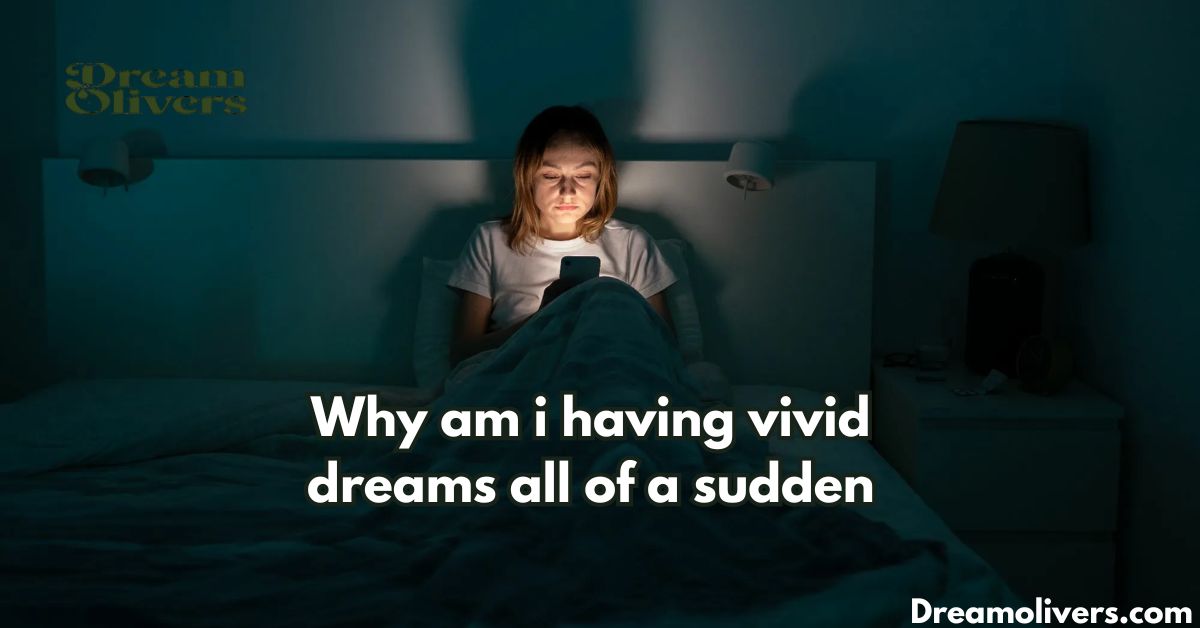Have you ever woken up from a strange, unsettling, or intensely vivid dream, wondering why am I having vivid dreams all of a sudden or what it might mean? You’re not alone. Weird dreams are something we all experience at some point, and they often seem to come out of nowhere. This article will explore the psychology behind these unusual experiences, focusing on their causes, meanings, and the deeper layers of our subconscious mind.
Many individuals have experienced vivid dreams all of a sudden. Vivid dreams, often accompanied by unusual scenarios, bizarre symbolism, or overwhelming emotions, leave us confused and searching for answers. Why do these dreams appear, and more importantly, why now? Understanding the triggers and underlying psychological forces can help decode the strange dream experiences you might be having. Let’s take a closer look at what happens in your mind when you dream, and why some of those dreams may be intensely weird.
Understanding Dreams
What Are Dreams?
Dreams are natural phenomena that happen during sleep, particularly in the REM (Rapid Eye Movement) sleep phase, where the brain is highly active. During sleep, the mind works to process emotions, memories, unresolved issues, and even our hopes and fears. These reflections surface in the form of vivid images, fragmented scenes, or sometimes entire narratives that unfold in our minds.
Interestingly, dreams are not limited to the typical sequences we might expect, like simple storylines. Some dreams are bizarre, unpredictable, or outright strange. Often, we wake up from these dreams thinking: “What was that all about?”
The Role of REM Sleep in Dreams
The bulk of vivid dreams occurs during the REM sleep cycle—a stage where our brains experience rapid eye movements, intense brain activity, and heightened vividness in dreams. REM sleep occurs multiple times throughout the night, increasing in duration as we sleep longer. The final REM cycle can be incredibly long, sometimes lasting up to 60 minutes, which leads to even more intense and memorable dreams.
This is the stage when the brain becomes most active, much like when we’re awake, and is also when the body is paralyzed to prevent us from physically acting out our dreams. However, with all this activity comes the possibility of vivid, strange, or unusual dreams.
The Spectrum of Dream Intensity

Dreams come in various intensities, ranging from hazy, fleeting thoughts to incredibly intense, vivid experiences. Some of the most bizarre and unsettling dreams tend to come in the form of intense dreams that we can vividly recall upon waking.
How Intensity Affects Dream Content
The intensity of a dream often reflects the emotional state or mental activity of the person experiencing it. Emotional events, unresolved anxieties, and significant life changes can trigger sudden changes in the dream intensity spectrum. On one end, you may have dreams that feel vague, foggy, or incomplete—an experience of little meaning or detail. On the other hand, you may experience intensely vivid dreams, where every detail, from sounds to colors, is sharp and clear.
This emotional intensity can be a direct result of stress or a recent event in your life that caused a significant emotional response. Whether it’s an impending work deadline, family issues, or an emotional trauma, the brain will often process these feelings during REM sleep, leading to vivid and sometimes unsettling dreams.
Common Triggers for Weird Dreams
Understanding the dream triggers is essential in unraveling the mystery behind weird dreams. These triggers can come from various sources, from emotional states to physical health. They may seem random, but upon closer inspection, you may realize certain common patterns that align with these triggers.
Stress and Anxiety: A Major Trigger for Strange Dreams
One of the most common triggers for weird dreams is stress. Stress, whether chronic or acute, tends to stimulate the brain and emotional systems, causing an overload of information that may spill over into your dreams.
For instance, if you’re facing significant anxiety due to a work deadline, financial struggles, or personal issues, your mind may try to “process” this stress during sleep. As a result, your brain could turn your subconscious thoughts into strange, vivid, and sometimes even irrational dream sequences.
- Dreams of falling: Often tied to feelings of insecurity, fear, or loss of control in real life.
- Chased dreams: Can reflect your attempts to escape your anxieties, responsibilities, or challenges.
These dreams often happen suddenly when you are experiencing a spike in stress or when dealing with unresolved emotional concerns. You may wake up with a racing heart, having dreamed of being chased or falling endlessly, and the strange thing is, you often don’t remember the context. Why did your brain decide to produce such vivid and distressing scenarios?
Medication: A Chemical Influence on Your Dream World
Many people who start or change their medications report a shift in their dream patterns. Certain medications, such as antidepressants, sleep aids, or even over-the-counter drugs, have side effects that influence the way we dream.
- Antidepressants: These drugs increase the levels of serotonin and norepinephrine in the brain, and can sometimes cause weird dreams. People taking these medications may experience vivid, out-of-place imagery or even nightmares.
- Sleep aids: Drugs like Ambien or Zzzquil are designed to help with sleep but can cause vivid dreams during the sleep cycle. Some users report highly disorienting or surreal dreams.
Medications can disrupt the natural flow of REM sleep, and as a result, the intensity of dreams can increase dramatically. It’s crucial to monitor how your medication might be influencing your dream patterns.
Sleep Disturbances: The Link Between Poor Sleep and Weird Dreams
Sleep disturbances can also play a significant role in dream intensity. Conditions like insomnia, sleep apnea, and restless leg syndrome cause interruptions during the sleep cycle, especially REM sleep, which in turn affects the quality of dreams.
- Insomnia: When you struggle to fall asleep or stay asleep, your REM sleep may become fragmented, leading to irregular or weird dreams. Often, people with insomnia report dreams that are more vivid or intense, possibly due to waking up repeatedly during the night and returning to REM sleep with an active mind.
- Sleep apnea: A condition where your breathing stops and starts during sleep can cause waking moments, which disrupt REM sleep. This can lead to increased vivid dreaming during the periods when sleep is finally uninterrupted.
The quality of your sleep plays a direct role in the nature of your dreams. Disrupted sleep cycles can cause vivid dreams to occur more frequently and often with disturbing or strange content.
Lifestyle Factors: Diet and Exercise Affecting Dreams
What you eat and how you live also impacts your sleep and dream patterns. Here’s how lifestyle factors come into play:
- Caffeine and Nicotine: Both of these substances are stimulants that affect your nervous system and make it harder to fall into deep, restful sleep. Caffeine can interfere with REM sleep, leading to dream disturbances. Nicotine has a similar effect, especially when smoked too close to bedtime.
- Heavy meals before bed: Eating a large meal late at night can lead to discomfort and indigestion, which can disrupt sleep. This may cause you to wake up in REM sleep, resulting in vivid and unusual dreams.
- Exercise: Regular physical activity, especially aerobic exercise, can promote deeper and more restorative sleep. On the other hand, too much intense exercise late in the evening can interfere with your ability to fall asleep, disrupting your sleep cycle stages and possibly leading to unsettling dreams.
The Psychology of Weird Dreams

The Subconscious Mind and Dream Interpretation
One of the fundamental theories of dream psychology revolves around the subconscious mind. Our subconscious mind stores our repressed desires, fears, and unresolved emotional conflicts. According to Freudian dream analysis, dreams often reflect unconscious desires that we might not be aware of in our waking lives.
On the other hand, Jungian psychology focuses on the collective unconscious and archetypes, which are universal symbols and patterns that show up in dreams. For instance, flying dreams can symbolize a desire for freedom or escape, while water dreams can signify emotional renewal or turmoil.
These archetypes and symbols appear in our dreams to help process feelings we may not consciously acknowledge. Sometimes, these symbols can appear in highly unusual or weird scenarios, leading us to question what they mean.
Emotional Processing During Sleep
Dreams are not just a jumble of random images; they serve an important emotional processing function. During sleep, especially in REM sleep, the brain works to process emotions and memory. For instance, if you’re dealing with trauma or stress in your waking life, your dreams may attempt to process those emotions, leading to intense, vivid, or weird dream experiences.
If you’re going through difficult emotions—be it sadness, fear, or anger—your subconscious might express these feelings in strange or exaggerated dream scenarios. Your mind is processing your emotional experiences, sometimes in bizarre or irrational ways.
Decoding Weird Dream Themes
Falling Dreams
Dreams about falling are among the most common. These can symbolize feelings of insecurity, fear, or lack of control in one’s waking life. In some cases, falling dreams may also be related to anxiety about an important event, such as a major decision, work deadline, or significant life change.
Flying Dreams
On the opposite end, flying dreams are often associated with feelings of freedom, empowerment, and the desire to escape. For some, flying represents a liberation from stress or constraints, while for others, it may signify the ability to rise above problems.
Water Dreams
Water is often seen as a representation of emotions in dreams. Calm water can symbolize peace, while rough or turbulent water often reflects emotional turmoil or anxiety. Dreams about drowning in water, for instance, could signify feeling overwhelmed by your emotions or a situation in your life.
Addressing Common Concerns
Why Am I Having Weird Dreams All of a Sudden?
When people experience a sudden onset of vivid dreams, it often correlates with changes in their emotional state, stress levels, or physical health. A new life challenge or stressor, such as a relationship issue or work pressure, can lead to sudden increases in dream intensity.
Can Weird Dreams Be a Sign of an Underlying Psychological Issue?
Persistent, intense, or disturbing dreams might be linked to unresolved trauma, anxiety disorders, or emotional regulation issues. If weird dreams become frequent and are affecting your quality of life, seeking professional help may provide insight into any underlying subconscious conflicts.
How Can I Cope with Weird Dreams?
To reduce the occurrence of vivid or unsettling dreams, try engaging in relaxation techniques such as meditation, mindfulness, or yoga before bed. Additionally, practicing dream journaling can help you track patterns in your dreams and gain more insight into their potential meanings.
Frequently Asked Questions
Why am I suddenly having really vivid dreams?
Sudden vivid dreams can occur due to increased stress, anxiety, or changes in your sleep patterns, which heighten brain activity during REM sleep. Lifestyle changes, medication, or unresolved emotions can also trigger more intense and memorable dreams.
What does it mean if you suddenly start dreaming a lot?
Starting to dream more frequently could indicate heightened stress, emotional processing, or changes in your sleep cycle. It might also be a sign that your subconscious mind is working through unresolved issues or intense emotions.
Are vivid dreams a symptom of anything?
Vivid dreams can be a symptom of stress, anxiety, or sleep disturbances like insomnia or sleep apnea. They may also result from changes in medication or emotional processing during REM sleep.
Why are my dreams so disturbing lately?
Disturbing dreams can be triggered by increased stress, anxiety, or emotional turmoil, causing your subconscious to process unresolved issues. Sleep disturbances or changes in medication can also heighten the intensity and unsettling nature of your dreams.
Do vivid dreams mean good sleep?
Vivid dreams don’t necessarily indicate good sleep; they often occur during REM sleep, but disruptions in sleep cycles can affect their quality. While vivid dreams may feel intense, they can be a sign of stress or sleep disturbances rather than restful sleep.
Can bad dreams be a warning?
Bad dreams can sometimes act as a warning from your subconscious, reflecting unresolved stress, anxiety, or emotional conflicts. They may highlight underlying issues that need attention in your waking life.
Do weird dreams mean anything?
Weird dreams often carry symbolic meaning, reflecting your subconscious mind, emotions, or unresolved conflicts. They can provide insight into areas of stress, fear, or desire that you may not fully recognize in your waking life.
Why am I suddenly having lucid dreams?
Sudden lucid dreams may occur due to changes in sleep patterns, heightened stress, or increased awareness during REM sleep. They can also result from techniques like dream journaling or meditation, which enhance your ability to control your dreams.
What do vivid recurring dreams mean?
Vivid recurring dreams often signal unresolved emotions or stress that your subconscious is trying to process. They may highlight patterns in your life or lingering fears that require attention or resolution.
What are your dreams telling you?
Your dreams often reflect your subconscious mind, revealing hidden emotions, desires, or unresolved issues. They can offer valuable insights into your mental state, fears, and internal conflicts that may need attention.
Conclusion
Weird, vivid, or unsettling dreams are a natural part of the human experience. They are reflections of our emotional state, subconscious mind, and even physical health. By understanding the causes and psychological significance of these dreams, we can better navigate their meanings. So the next time you wake up from a vivid dream, remember, it’s not random your brain is trying to process something deeper.
Dreams may be strange, but they are far from meaningless. By paying attention to dream patterns and symbolism, you can unlock the hidden messages your subconscious is trying to communicate.
>>>Read Also: Dream About Hair Falling Out: Meaning and Symbolism

DreamOlivers, guided by Tina Hudson, is a spiritual space for inner peace and growth. Offering profound insights, it helps you connect with your higher self. Embrace wisdom and inspiration for a balanced, fulfilling life.

